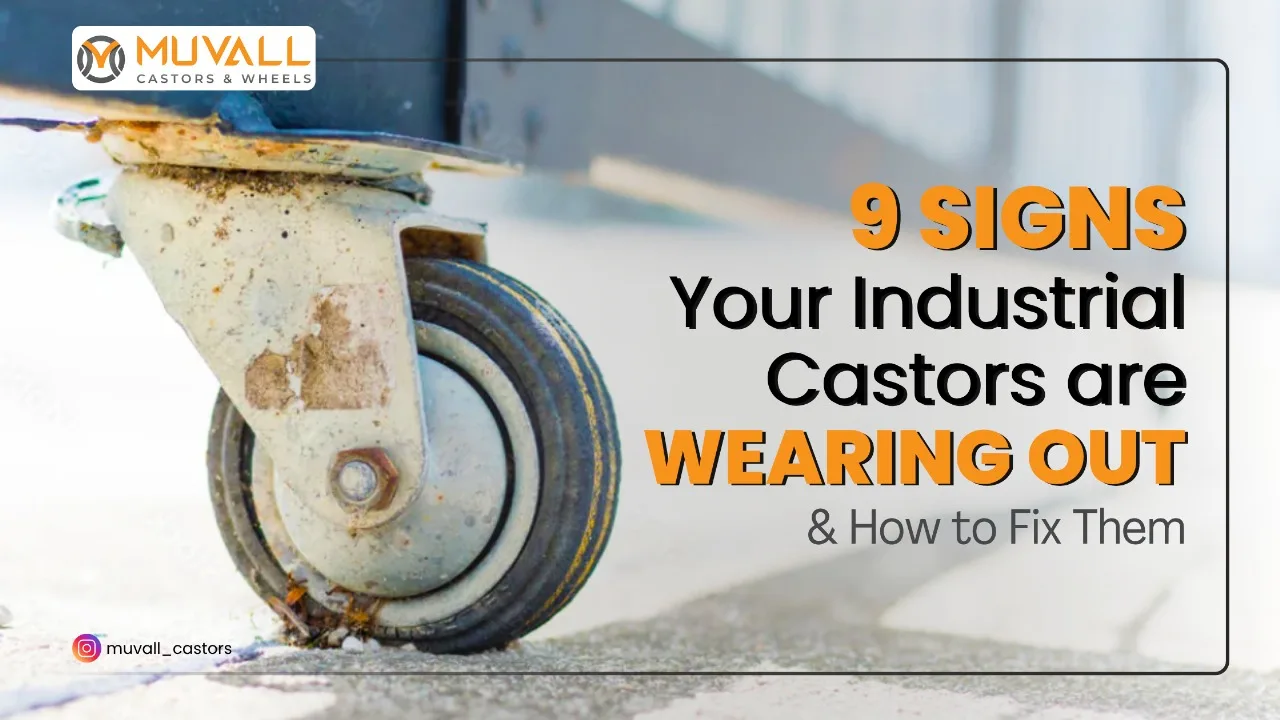
Industrial castors are the unsung heroes of many workplaces — from warehouses and factories to hospitals and airports. These small but mighty wheels enable heavy machinery, trolleys, and carts to move smoothly and safely, improving efficiency and reducing worker fatigue.
But like any equipment, caster wheels don’t last forever. Worn-out or damaged industrial castors can lead to increased downtime, safety risks, and costly repairs if not addressed early. That’s why it’s crucial to know the warning signs that your trolley wheels need attention — and how to fix them before problems escalate.
In this blog, we’ll walk you through 9 signs your industrial castors are wearing out, plus practical tips to keep your equipment rolling smoothly.
1. Difficulty Steering or Maneuvering
If your trolley or equipment suddenly feels harder to steer, it’s often a sign that the caster wheels are worn or jammed. Dirt, debris, or damage to the swivel mechanism can reduce mobility.
How to Fix:
Check for threads or other debris stuck in the fork where the wheels are assembled with the castor and remove it.
Clean the wheels and swivel joints regularly to remove debris.
Lubricate swivel bearings with a suitable grease.
2. Uneven or Worn Wheel Treads
Uneven wear on the wheel tread affects smooth rolling and can damage floors. It also puts extra strain on the castor assembly.
How to Fix:
Inspect the wheel tread regularly.
Replace wheels with uneven or bald treads immediately.
Choose durable wheel materials (e.g., nylon for rough surfaces).
3. Excessive Noise During Movement
Loud squeaks or grinding noises signal problems with the industrial castors. This could be due to worn bearings, lack of lubrication, or damaged wheels.
How to Fix:
Apply lubricant to the wheel bearings and swivel joints.
Replace bearings or entire wheels if noise persists.
Ensure the wheels are suitable for your floor type to reduce noise.
4. Visible Cracks or Breaks in the Wheel
Cracks, chips, or broken parts on the wheels compromise load capacity and safety.
How to Fix:
Inspect wheels for visible damage regularly.
Replace any damaged wheels promptly — never try to repair cracks.
Use wheels made of materials suitable for your load and environment.
5. Castors Not Locking Properly
Many trolley wheels come with locking mechanisms to keep equipment stationary. If locks don’t hold, it can lead to dangerous movement.
How to Fix:
Check the locking mechanism for dirt or damage.
Clean and lubricate the lock parts.
Replace the locking castor if it fails to hold after cleaning.
6. Uneven Equipment Height or Wobbling
Wobbling or uneven height suggests that one or more castors are damaged or worn unevenly.
How to Fix:
Check all wheels for consistent size and condition.
Replace mismatched or worn wheels.
Make sure all wheels are rated for the equipment’s load.
7. Difficulty in Rolling Over Floor Obstacles
If the trolley wheels struggle to roll over small obstacles like cracks or bumps, it can be due to worn wheels or inappropriate wheel size.
How to Fix:
Choose larger diameter wheels for rough or uneven floors.
Replace worn wheels with new ones designed for your floor conditions.
Consider soft tread materials for sensitive floors.
8. Corrosion or Rust on Metal Parts
Corrosion weakens the castor’s structural integrity, especially in humid or chemical-exposed environments.
How to Fix:
Inspect metal parts regularly for rust.
Clean and apply anti-rust coatings if corrosion is minor.
Replace severely corroded castors.
Opt for stainless steel or corrosion-resistant materials if needed.
9. Increased Effort Required to Move Loads
If your workers report needing more force to push or pull trolleys, the industrial castors may be failing.
How to Fix:
Inspect wheels and swivel joints for wear or damage.
Lubricate moving parts regularly.
Replace worn wheels or bearings to restore smooth motion.
Also Read: How Castor Wheels Revolutionize Material Handling in Various Industries
Final Tips for Maintaining Your Industrial Castors
Proper maintenance can extend the life of your caster wheels and save on downtime:
Schedule Regular Inspections: Check wheels, bearings, and locks monthly.
Keep Wheels Clean: Remove debris and dirt that can cause wear.
Lubricate Moving Parts: Use the right lubricants for bearings and swivels.
Use the Right Wheels: Match wheels to your floor type and load requirements.
Replace in Time: Don’t wait for castors to fail completely — replace worn parts early.
Why Quality Industrial Castors Matter
Investing in high-quality industrial castors and trolley wheels pays off in the long run with safer, smoother operations and fewer repairs. At Muvall Castors, we offer a wide range of durable, reliable castor wheels designed to fit various industries and applications.
If you suspect your castors need attention or want to upgrade your equipment, contact us today for expert advice and solutions!